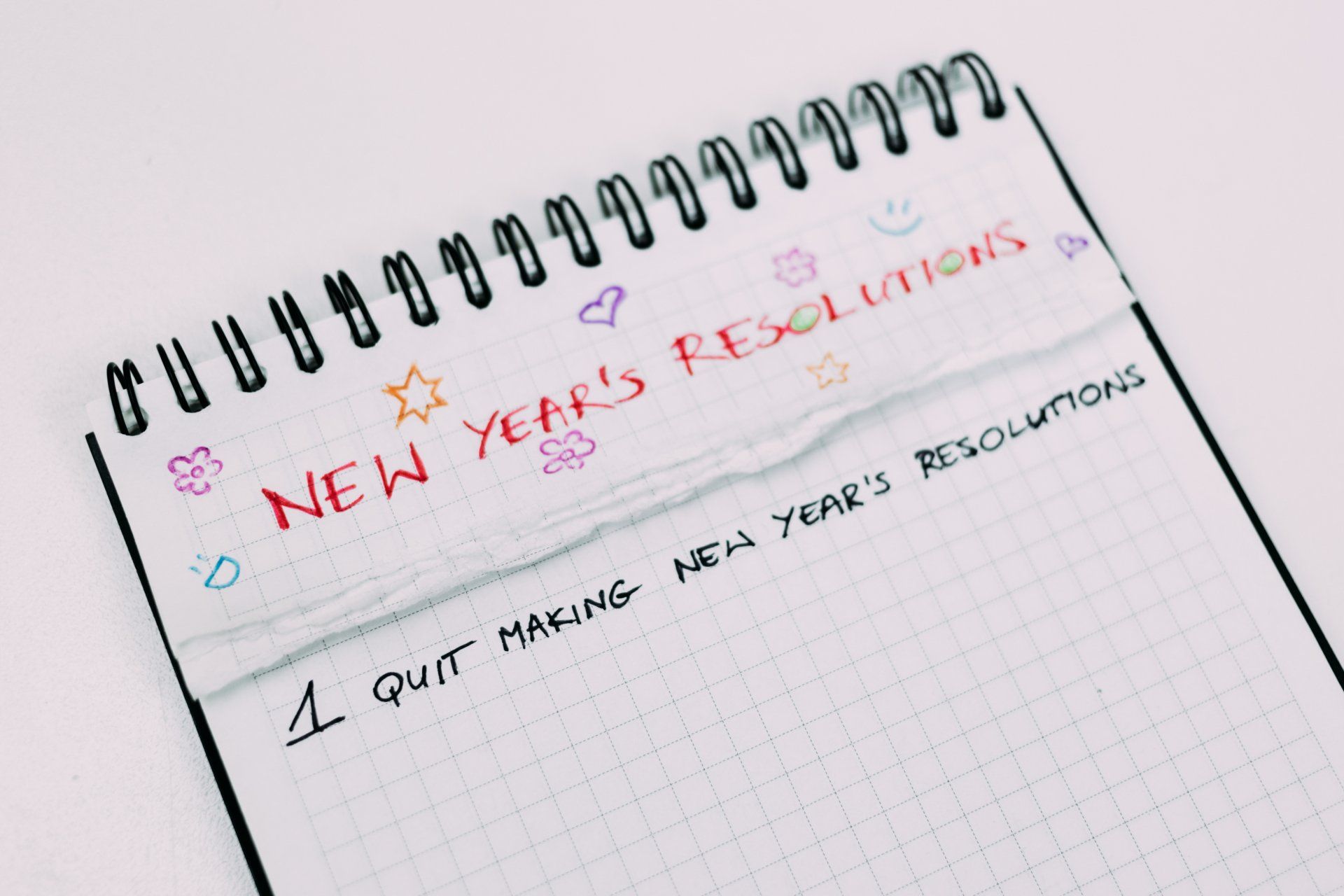Continuing Resolutions, Not Just New Year's Resolutions
Continuing, personal resolutions can make an intentional, long-term, positive difference in our lives.
“Changes that seem small and unimportant at first will compound into remarkable results if you’re willing to stick with them for years.”
~James Clear, Atomic Habits, p. 7

In early January of every year, advice about creating and committing to New Year’s resolutions bombard all of us. From TV shows to podcasts to newsletters to articles, the importance of reflecting upon, setting, and maintaining these goals overwhelms just about every other topic. The inevitable setting of these resolutions, the energetic and committed effort to honor them and then the subsequent, for so many of us, discarding of them a month, week, or even a day later becomes an annual ritual.
We get into a cycle of setting these resolutions each year and then not meeting them, setting them and then not meeting them again, and on and on. The inevitability of this process of intending and forsaking becomes an expectation and most of us have a chuckle about it, recognizing that we are likely going to be back to our normal ways-of-being come February. But it’s not really something to laugh about, because those failures reinforce that lack of fortitude.
For those who set these commitments and then meet them, it’s a character-building exercise. Doing what one sets out to do builds willpower which, when added to other commitment-completions, builds integrity (we did what we said we would do) and self-confidence (I CAN do this or that, I HAVE before, and I WILL to this). James K.A. Smith, speaking of character development, puts it this way: “Virtues, quite simply, are good moral habits. (Bad moral habits, as you might guess, are called “vices.” Good moral habits are like internal dispositions to the good—they are character traits that become woven into who you are so that you are the kind of person who is inclined to be compassionate, forgiving, and so forth.”
But that’s hard to do. Even with some great resources to help us these days, like James Clear’s Atomic Habits and Charles Duhigg’s The Power of Habit, changing habits or adding and keeping new commitments is a challenge.
I’d like to make the case for establishing “continuing resolutions” instead of worrying so much about “New Year’s resolutions”.
In the U.S. Congress, continuing resolutions are stopgap funding measures, with expiration dates, to keep government from shutting down until agreements can be made. One could argue – I do – that using these continuing resolutions as a matter of course develops a legislative habit of punting the ball down the field rather than making tough decisions. It represents a lack of fortitude rather than resolve, but that’s a whole other discussion.
But I digress – these congressional continuing resolutions are NOT the kind of continuing resolutions I’m advocating for here.
Continuing, personal resolutions can make an intentional, long-term, positive difference in our lives.
Instead of situating one time of year – the new year – as a focal point for goal setting, continuing personal resolutions are the ongoing commitments we make to ourselves that last far longer than a month or even a year. They build self-determination over time. They give us more control over our lives. They give us the power to transform ourselves in ways large and small. They compound over years, as James Clear says and, as Gunilla Norris notes, these tasks don’t have to be gigantic. “It is amazing,” she says, “how very small endeavors can bring us and others delight. Doing BIG things is not likely, but doing small things with great love is possible. Here’s a favorite quote of mind from Helen Keller: I long to accomplish a great and noble task, but it is my chief duty to accomplish small tasks as if they were great and noble.” (italics are from Gunilla Norris)
Continuing resolutions are ongoing commitments to what my colleagues Davin Carr-Chellman, Carol Rogers-Shaw, and I have called, “meta-practices.” These are “undertaken over time… [and] are those disciplines and practices which develop the qualities of profound learning and living. They have no end-point, require regular activity, and may involve a range of exercises to build rich, generative learning.” (We discuss meta-learning and meta-learning in our article, Formation as an organizing framework for the processes of lifelong learning.) We might choose just a few of these (contemplative practice or a daily exercise routine, as examples), but they will build over time and act as powerful support for other habits. Duhigg calls "keystone habits" those which help us to "reprogram the other routines" in our lives.
In contrast to the purpose of a congressional continuing resolution, personal continuing resolutions are firm decisions. They are tied to long-term, perhaps lifelong practices, which might be spiritual disciplines, healthy lifestyle, development of the mind, or relationship-building. They don’t punt the ball down the field, they are habits, routines, and disciplines which occur often, perhaps daily, often "now."
Some synonyms for the word “resolute” are steadfast, determined, decided, persevering, dogged, and undaunted. Antonyms for “resolute” are vacillating, cautious, weak-minded, and hesitant (also, the birds – hen-hearted, chicken-hearted, pigeon-livered). To have “resolve” is to intend, persist, and conclude. A resolution in both the sense of New Year’s resolutions and what I am calling here continuing personal resolutions, is to commit to something, with determination. And committing to something requires going as much as one can from vague to precise. From unaccountable to observable and even measurable because there are so, so many real concerns along with bling and glitter vying for our attention. “In a world of distraction,” Ryan Holiday said, “focusing is a superpower.”
“In a world of distraction, focusing is a superpower.”
~Ryan Holiday, Discipline is destiny: the power of self-control, p. 123
In summary, both New Year’s Resolutions and Continuing Personal Resolutions are helpful. They serve to focus us on what we perceive to be real personal improvement opportunities. Both can make a significant and long term, positive difference in our lives. New Year’s Resolutions however, for many, turn out to be empty promises, made on a whim or even after considerable reflection, that are quickly dropped or which never really “take hold” of us. Continuing resolutions, taken on for long periods of time, perhaps a lifetime, build upon themselves and can actually change who we are and how we live and our quality of life.
“It is amazing how very small endeavors can bring us and others delight. Doing BIG things is not likely, but doing small things with great love is possible. Here’s a favorite quote of mind from Helen Keller: I long to accomplish a great and noble task, but it is my chief duty to accomplish small tasks as if they were great and noble.”
~Gunilla Norris, The Light of Evening: Meditations on Growing in Old Age, p. 38
Sources/Resources
Clear, J. (2018). Atomic habits: tiny changes, remarkable results: an easy & proven way to build good habits & break bad ones. Avery, an imprint of Penguin Random House.
Duhigg, C. (2014). Power of habit: why we do what we do in life and business (Random House Trade Paperback Edition ed.). Random House Trade Paperbacks.
Norris, G. (2022). The light of evening: meditations on growing in old age. Twenty-Third Publications.
Holiday, R. (2022). Discipline is destiny: the power of self-control. Portfolio/Penguin.
Kroth, M., Carr‐Chellman, D. J., & Rogers‐Shaw, C. (2022). Formation as an organizing framework for the processes of lifelong learning. New Horizons in Adult Education and Human Resource Development, 34(1), 26-36.
Smith, J. K. A. (2016). You are what you love: the spiritual power of habit. Brazos Press, a division of Baker Publishing Group.

“Virtues, quite simply, are good moral habits. (Bad moral habits, as you might guess, are called “vices.”} Good moral habits are like internal dispositions to the good—they are character traits that become woven into who you are so that you are the kind of person who is inclined to be compassionate, forgiving, and so forth.”
~James K.A. Smith, You Are What You Love: The Spiritual Power of Habit, p. 16.










